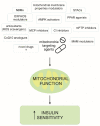Targeting Mitochondria in Diabetes
- PMID: 34205752
- PMCID: PMC8233932
- DOI: 10.3390/ijms22126642
Targeting Mitochondria in Diabetes
Abstract
Type 2 diabetes (T2D), one of the most prevalent noncommunicable diseases, is often preceded by insulin resistance (IR), which underlies the inability of tissues to respond to insulin and leads to disturbed metabolic homeostasis. Mitochondria, as a central player in the cellular energy metabolism, are involved in the mechanisms of IR and T2D. Mitochondrial function is affected by insulin resistance in different tissues, among which skeletal muscle and liver have the highest impact on whole-body glucose homeostasis. This review focuses on human studies that assess mitochondrial function in liver, muscle and blood cells in the context of T2D. Furthermore, different interventions targeting mitochondria in IR and T2D are listed, with a selection of studies using respirometry as a measure of mitochondrial function, for better data comparison. Altogether, mitochondrial respiratory capacity appears to be a metabolic indicator since it decreases as the disease progresses but increases after lifestyle (exercise) and pharmacological interventions, together with the improvement in metabolic health. Finally, novel therapeutics developed to target mitochondria have potential for a more integrative therapeutic approach, treating both causative and secondary defects of diabetes.
Keywords: blood cells; diabetes therapy; exercise; insulin resistance; liver; mitochondria; respiration; respiratory capacity; skeletal muscle; type 2 diabetes.
Conflict of interest statement
The authors declare no conflict of interest.
Figures



References
-
- Saeedi P., Petersohn I., Salpea P., Malanda B., Karuranga S., Unwin N., Colagiuri S., Guariguata L., Motala A.A., Ogurtsova K., et al. Global and regional diabetes prevalence estimates for 2019 and projections for 2030 and 2045: Results from the International Diabetes Federation Diabetes Atlas. Diabetes Res. Clin. Pract. 2019;157:107843. doi: 10.1016/j.diabres.2019.107843. - DOI - PubMed
Publication types
MeSH terms
Substances
Grants and funding
LinkOut - more resources
Full Text Sources
Medical

